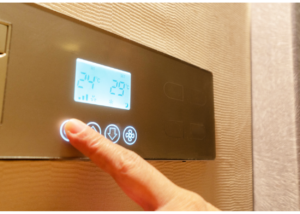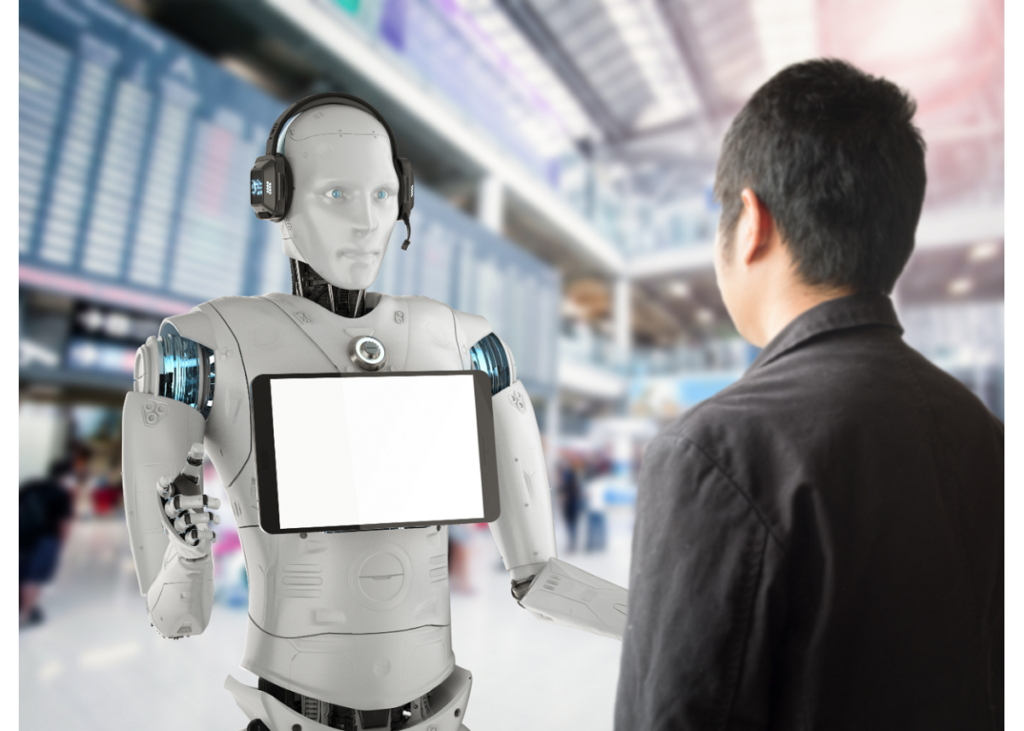Hotels Should Be Investing in Technology – But What Should They Focus On?
- The current state of hotel technology: How does your property measure up?
- Getting back to basics (Hint: They’re still important)
- The power of touch(less)
- The Internet of Things: Smart solutions for hotels
- Stand out from the crowd by implementing AI, robotics, and AR/VR
- Things to watch out for when choosing hotel technology
- Conclusion
- Here are some helpful links to learn more
The current state of hotel technology: How does your property measure up?
In recent years, we’ve seen exciting developments in technology for hospitality properties, from updated standards that support better WiFi to solutions for greater automation, efficiency, and sustainability. Guests now expect some of these hotel technology offerings as “must haves”, while others have become differentiators that can make properties stand out among their competitors. The right combination of solutions can provide a better guest experience, improve the efficiency of operations, and offer cost savings to property owners and operators.
Where do hotels stand now in terms of technology implementation? Here are some insights:
- More than 80% of hoteliers say technology is important to their business and that guests expect new technology, but recent numbers show that tech spending by hotels is slightly down.
- Over 90% of hotel IT managers consider WiFi a must-have, and almost all hotels now offer WiFi, but many haven’t upgraded to the latest WiFi standards; on average, hotels remain about a year behind other industries in terms of next-gen WiFi adoption, and only about a quarter of the market is now using WiFi 6/6E.
- Over 90% of guests expect free WiFi and most say the quality of a hotel’s Internet will be a factor in whether they’ll stay there again; despite the importance of WiFi performance, nearly 70% of guests complain of slow WiFi connections in hotel rooms.
- Many hotels are starting to incorporate touchless options, including kiosk-based check-in and mobile check-in; those numbers have increased by two-thirds since the pandemic began. Over 60% of hoteliers now report using a standard check-in process; the rest have incorporated some form of self-service, but less than 3% report that they offer fully self-service check-in.
- The use of mobile keys has also increased greatly during the pandemic; branded hotels are offering them at twice the rate of independent hotels.
- Over 80% of hotels have implemented at least one form of technology during the pandemic; however, even just a few years ago, only around a third of hotels were using specialized software such as a PMS, and a quarter were still using pen and paper for some management functions!
- Between two-thirds and three-quarters of guests are expecting technologies such as contactless payment, mobile reservations, and digital signage, and the majority of hoteliers are expecting to add those options within the next year if they don’t already offer them.
Roughly 3 in 4 guests say that they’d be likely to return to a hotel if it meets their technology needs, and over 80% of hoteliers believe that technology will become increasingly important in the next 5 years, making the landscape increasingly competitive. To take your hotel from a mere place to stay to somewhere that guests actually want to be, and to go from just getting by to functioning at your best, you’ll need to invest in technology. But with so many solutions out there, it can be tough to know what to focus on.
In this article, we’ll discuss some of the key technology solutions that are important for modern hotels to invest in. We’ll break things down into several categories, starting with the absolute must-haves for every modern hotel, then considering other recent technology that guests are starting to expect, and finally discussing more advanced solutions, some of which are becoming increasingly important for operational efficiency and guest desirability.

Getting back to basics (Hint: They’re still important)
- Digital infrastructure is the backbone of the technology ecosystem, playing a vital role in almost every part of a property’s operations. Options to consider here include fiber, copper cabling, and wireless backhaul. Read our article “Digital Infrastructure: The Foundation for Better Guest & Resident Experiences” for more information.
- Fast, accessible, reliable WiFi throughout the property (indoors and outdoors) is a must-have for hotel guests; the vast majority rate it as the #1 amenity they seek in a hotel. Guests expect to be able to connect their devices easily for a home-like experience during their stay, and they’re likely to rate your hotel poorly if their Internet experience is not good.
- A modern VoIP phone system is crucial for communication that supports your operations and meets federal regulations for things like 911. The best systems will integrate with your PMS, will enable system-wide updates and management, and will enhance your guest experience with features such as personalized messaging, touchless checkout, and access to guest services.
- CCTV cameras offer real-time monitoring for improved security throughout your property. The security feed behind your front desk lets your guests, your staff, and any troublemakers know that your hotel is using security cameras with the latest technology to monitor lobbies, hallways, pools, exterior doors, and other public areas for deterrence and peace of mind. A good solution will generally include digital storage locally or in the cloud (or both), day-night cameras, and remote viewing and management.
- To support front office and back office functions, hotels will commonly rely on a property management system (PMS) to maintain customer data and link together all the information needed to manage a property. It can also provide an enhanced guest experience, including touchless check-in and check-out, which many guests are seeking even post-pandemic. There are many options for PMS for hotels that support key functions such as reservation and room management, coordination of staff, payment management, and much more, and the best options enable integration with your other technology solutions.
The power of touch(less)
As noted previously, guests are increasingly seeking a touchless approach. Roughly 40% say they want either a mostly or fully self-service model that offers touchless check-in/check-out, food service, and more, and nearly 75% would prefer to stay at a hotel that offers self-service technology to minimize interactions with staff. More than 9 out of 10 hoteliers say they’re intending to add at least some technology to enable a touchless experience. To meet this demand, some of the options your hotel can offer include:
- Mobile check-in and kiosk-based check-in are two ways to offer touchless check-in for guests. Surveys show that guest satisfaction decreases significantly when they have to stand in line for check-in; both options offer a way to avoid this while also freeing your staff to perform tasks that add greater value and require a human touch. One survey showed that 2/3 of guests would choose a hotel that offered digital check-in over one that didn’t.
- Contactless payments are certainly an important part of the touchless check-in/check-out experience, as well as for associated amenities such as spas and restaurants. While some guests are also seeking additional options such as cryptocurrency payments, not many are requesting these options, so it may not be necessary yet for most hotels to add these options.
- Kiosks can be used not only for check-in, but also for digital concierge functions such as gathering information, ordering tickets for local events, and printing boarding passes.
- Digital signage is also growing in popularity. It can be used to display directional information, event updates, menus, special offers, and more.
- Mobile keys offer touchless functionality, allow for remote configuration and management, reduce operating costs, and improve the security of your entire property.
- Apps can be used to offer a variety of these functions in one place, making it easier for guests to choose a property, book a room, check in (potentially even before they arrive), get a mobile key, adjust room settings, book amenities, discover local information, and more. Not only does this decrease friction, but it also has the potential to increase loyalty. However, be aware that guests are starting to resist downloading additional apps – so if you do decide to use one, be sure it adds value and can be used for multiple purposes.
- Voice-controlled devices allow guests to order room service, schedule appointments, access concierge services, adjust lighting, temperature, curtains, and door locks, control TV and entertainment options, and more. Although guests aren’t yet demanding this technology in high numbers at hotels, as more and more people use it at home, they will certainly start to expect it as part of their home-like hotel experience.

The Internet of Things: Smart solutions for hotels
The Internet of Things (IoT) is an environment of connected objects such as sensors and controls that are often incorporated into smart solutions. This isn’t just a cool trend; such solutions result in better service and improved operations at a lower cost and offer the smart, touchless, personalized functionality that guests are coming to expect. Examples include:
- Operational monitoring and automation solutions use items such as smart thermostats and smart lighting to improve energy management and sustainability by adjusting settings based on whether a space is in use. Similarly, in smart event spaces hosts can easily adjust door access settings, temperature, lighting, and more based on the needs of an event. Not only will this save money, but it will meet the expectations of guests who are increasingly seeking “green” hotels.
- Workforce automation technology can improve your staff’s efficiency, workflow, and reduce burnout, and hotels that have implemented at least some automation report increased employee satisfaction levels. Also, in the face of workplace shortages, automation may be a good option for completing menial tasks, enabling your employees to focus on those items that add value for your property and your guests.
- Maintenance and logistics solutions offer ways to use systems more efficiently, spot problems that need to be fixed, and enable staff to respond more quickly to guest needs. For example, preventive maintenance solutions detect issues before guests complain; smart solutions are available that monitor for problems such as air quality issues and water leaks. (Did you know that a single leaky toilet can cost over $800 per year, not including the cost of water damage?)
For greater efficiency of operations, you can use smart solutions with sensors to alert your staff when shelves need to be replenished, RFID & GPS tags to keep track of equipment such as food trays and luggage carts, and usage tracking to determine when to restock inventory.

Stand out from the crowd by implementing AI, robotics, and AR/VR
If you’ve got all the basics taken care of at your property, and you’ve already implemented a variety of smart solutions to improve operations and decrease costs – how can you make sure your property stands out even more against your competitors? Here are some emerging technologies that are starting to be implemented at hotels:
- Modern properties are now using robotics and virtual assistants to alleviate staff shortages and provide touchless service while maintaining high service scores.
- AI chatbots and automated text messaging solutions can often answer simple questions, alleviating pressure on front desk staff. Roughly 3/4 of guests say they’d prefer to use chatbots or text messaging for service requests.
- AI can also be used behind the scenes to automate repetitive tasks or to analyze information using predictive analytics. AI can be used to assign staff, forecast inventory, adjust pricing, and much more.
- Robots can perform simple cleaning tasks, deliver room service, act as butlers, and more – plus guests often find them intriguing and even “cute.”
- Properties are also implementing AR/VR technology to add to the “wow!” factor by providing new ways of interacting with the property – for example, offering virtual hotel tours and hospitality experiences, or offering AR-enhanced maps that can be used with guest devices to explore the local area. Some hotels and resorts have used AR to provide special experiences for guests incorporating favorite celebrities or childhood characters. AR and VR can also be good options to incorporate in staff training.
- Beaconing is another form of AR that can benefit both hotels and their guests by providing things like virtual keys or marketing offers depending on where a guest is located within the property, although care must be taken so that this doesn’t become intrusive for guests.
- Facial recognition can be used for things like room access or payment authorization. It can also be used to personalize the guest experience – for example, recognizing a repeat guest before they check in, enabling staff to greet them by name and allowing systems to adjust room settings and offer better service. Facial recognition can also be used more generally – for example, to determine how many people are in a room at the same time, or to gather information about people’s facial expressions to assess their mood. However, this particular technology needs to be handled with care due to privacy concerns and potential misuse.
Things to watch out for when choosing hotel technology
Using technology in the right ways can certainly improve your hotel’s efficiency and enhance your guests’ experience. However, there are some things to keep in mind when deciding how to implement these solutions:
- For example, guest privacy should be considered, as well as the need to provide service for guests who may not be as technology-savvy.
- Consider surveying your guests to assess whether they’re interested in technologies such as voice-controlled devices or robotics, or whether they view them negatively.
- You’ll also want to be sure there isn’t a single point of failure for your entire technology infrastructure and that you have a backup plan.
- And you’ll need to incorporate training for your staff to be sure they know how to handle both the new technology and what to do when a situation needs to be handled manually.
The biggest thing to watch out for is the need to balance human touch and technology. Guests may be seeking options for touchless and self-service technology, but that doesn’t mean they don’t appreciate a personal touch when it matters. Robotics and automation, for example, can result in a high-quality experience that meets standards nearly 100% of the time – but in some environments, such approaches can also come across as cold and impersonal. Even guests who say they strongly prefer a touchless/self-service experience also say they’d like the occasional personal greeting. You’ll need to consider this when deciding where and how to implement technology and when to incorporate a more human approach.
Conclusion
With the right technology ecosystem, including digital infrastructure and basic technology solutions and enhanced by smart solutions, touchless options, and more, your hotel can not only become more efficient and less expensive to operate, but you’ll also set your property apart with a better experience that keeps guests coming back.
Here are some helpful links to learn more
- New Wi-Fi Predictions for 2023 Mean Hoteliers Need to Get Up to Speed with Network Technology
- Embracing Digital Transformation
- Using technology to adapt hotels to a new era in hospitality
- 73% of travelers want hotels with self-service tech
- 10 ways smart technology is reshaping the hotel industry
- 75+ Hospitality Statistics You Should Know
- 2022 Lodging Technology Study: Redefining the Guest Experience
- How Augmented Reality is Transforming the Hospitality Industry
- How Virtual Reality (VR) Can Enrich the Hospitality Industry

